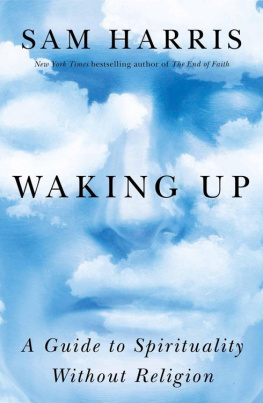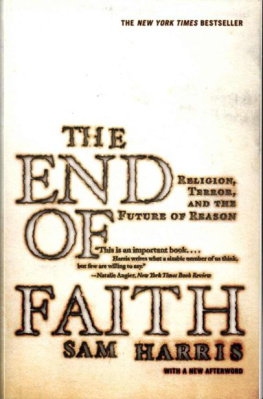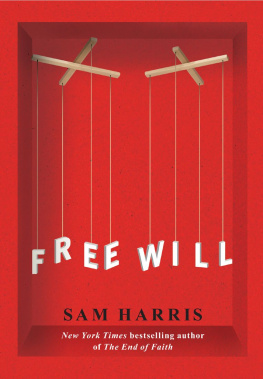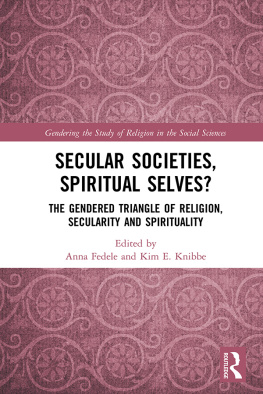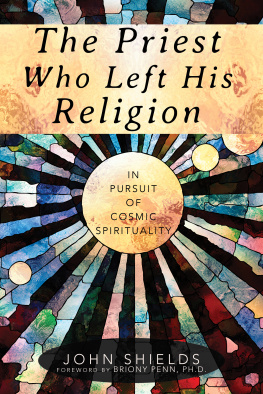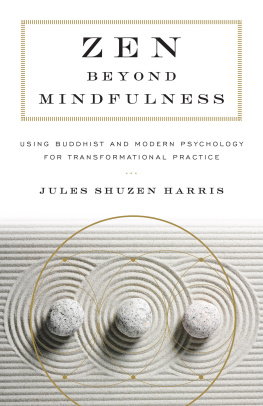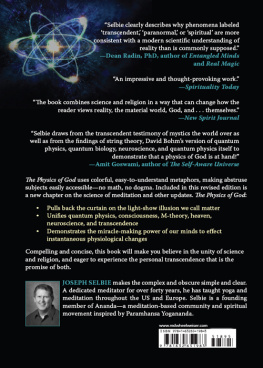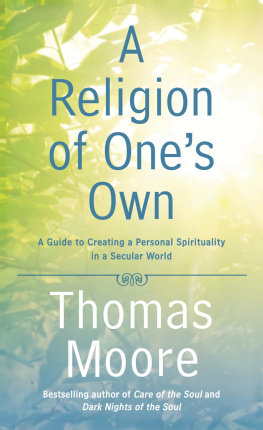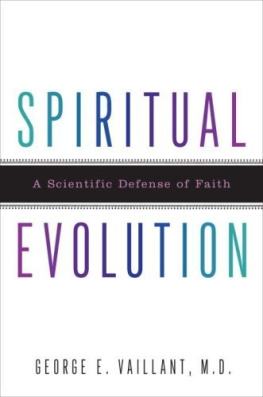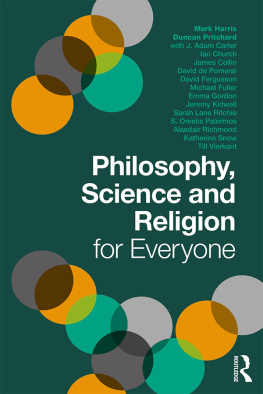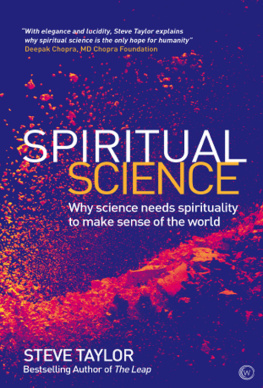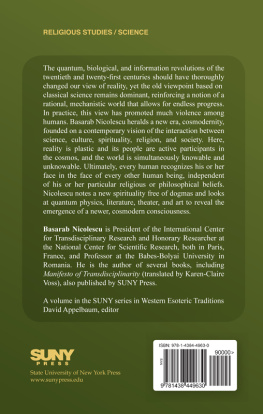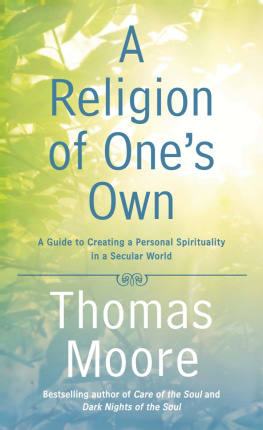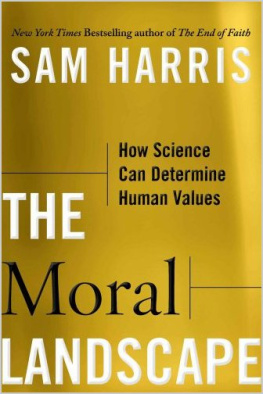Thank you for downloading this Simon & Schuster eBook.
Join our mailing list and get updates on new releases, deals, bonus content and other great books from Simon & Schuster.
C LICK H ERE T O S IGN U P
or visit us online to sign up at
eBookNews.SimonandSchuster.com
CONTENTS
For Annaka, Emma, and Violet
Chapter 1
Spirituality
I once participated in a twenty-three-day wilderness program in the mountains of Colorado. If the purpose of this course was to expose students to dangerous lightning and half the worlds mosquitoes, it was fulfilled on the first day. What was in essence a forced march through hundreds of miles of backcountry culminated in a ritual known as the solo, where we were finally permitted to restalone, on the outskirts of a gorgeous alpine lakefor three days of fasting and contemplation.
I had just turned sixteen, and this was my first taste of true solitude since exiting my mothers womb. It proved a sufficient provocation. After a long nap and a glance at the icy waters of the lake, the promising young man I imagined myself to be was quickly cut down by loneliness and boredom. I filled the pages of my journal not with the insights of a budding naturalist, philosopher, or mystic but with a list of the foods on which I intended to gorge myself the instant I returned to civilization. Judging from the state of my consciousness at the time, millions of years of hominid evolution had produced nothing more transcendent than a craving for a cheeseburger and a chocolate milkshake.
I found the experience of sitting undisturbed for three days amid pristine breezes and starlight, with nothing to do but contemplate the mystery of my existence, to be a source of perfect miseryfor which I could see not so much as a glimmer of my own contribution. My letters home, in their plaintiveness and self-pity, rivaled any written at Shiloh or Gallipoli.
So I was more than a little surprised when several members of our party, most of whom were a decade older than I, described their days and nights of solitude in positive, even transformational terms. I simply didnt know what to make of their claims to happiness. How could someones happiness increase when all the material sources of pleasure and distraction had been removed? At that age, the nature of my own mind did not interest meonly my life did. And I was utterly oblivious to how different life would be if the quality of my mind were to change.
Our minds are all we have. They are all we have ever had. And they are all we can offer others. This might not be obvious, especially when there are aspects of your life that seem in need of improvementwhen your goals are unrealized, or you are struggling to find a career, or you have relationships that need repairing. But its the truth. Every experience you have ever had has been shaped by your mind. Every relationship is as good or as bad as it is because of the minds involved. If you are perpetually angry, depressed, confused, and unloving, or your attention is elsewhere, it wont matter how successful you become or who is in your lifeyou wont enjoy any of it.
Most of us could easily compile a list of goals we want to achieve or personal problems that need to be solved. But what is the real significance of every item on such a list? Everything we want to accomplishto paint the house, learn a new language, find a better jobis something that promises that, if done, it would allow us to finally relax and enjoy our lives in the present. Generally speaking, this is a false hope. Im not denying the importance of achieving ones goals, maintaining ones health, or keeping ones children clothed and fedbut most of us spend our time seeking happiness and security without acknowledging the underlying purpose of our search. Each of us is looking for a path back to the present: We are trying to find good enough reasons to be satisfied now .
Acknowledging that this is the structure of the game we are playing allows us to play it differently. How we pay attention to the present moment largely determines the character of our experience and, therefore, the quality of our lives. Mystics and contemplatives have made this claim for agesbut a growing body of scientific research now bears it out.
A few years after my first painful encounter with solitude, in the winter of 1987, I took the drug 3,4-methylenedioxy-N-methylamphetamine (MDMA), commonly known as Ecstasy, and my sense of the human minds potential shifted profoundly. Although MDMA would become ubiquitous at dance clubs and raves in the 1990s, at that time I didnt know anyone of my generation who had tried it. One evening, a few months before my twentieth birthday, a close friend and I decided to take the drug.
The setting of our experiment bore little resemblance to the conditions of Dionysian abandon under which MDMA is now often consumed. We were alone in a house, seated across from each other on opposite ends of a couch, and engaged in quiet conversation as the chemical worked its way into our heads. Unlike other drugs with which we were by then familiar (marijuana and alcohol), MDMA produced no feeling of distortion in our senses. Our minds seemed completely clear.
In the midst of this ordinariness, however, I was suddenly struck by the knowledge that I loved my friend. This shouldnt have surprised mehe was, after all, one of my best friends. However, at that age I was not in the habit of dwelling on how much I loved the men in my life. Now I could feel that I loved him, and this feeling had ethical implications that suddenly seemed as profound as they now sound pedestrian on the page: I wanted him to be happy.
That conviction came crashing down with such force that something seemed to give way inside me. In fact, the insight appeared to restructure my mind. My capacity for envy, for instancethe sense of being diminished by the happiness or success of another personseemed like a symptom of mental illness that had vanished without a trace. I could no more have felt envy at that moment than I could have wanted to poke out my own eyes. What did I care if my friend was better looking or a better athlete than I was? If I could have bestowed those gifts on him, I would have. Truly wanting him to be happy made his happiness my own.
A certain euphoria was creeping into these reflections, perhaps, but the general feeling remained one of absolute sobrietyand of moral and emotional clarity unlike any I had ever known. It would not be too strong to say that I felt sane for the first time in my life. And yet the change in my consciousness seemed entirely straightforward. I was simply talking to my friendabout what, I dont recalland realized that I had ceased to be concerned about myself. I was no longer anxious, self-critical, guarded by irony, in competition, avoiding embarrassment, ruminating about the past and future, or making any other gesture of thought or attention that separated me from him. I was no longer watching myself through another persons eyes.
And then came the insight that irrevocably transformed my sense of how good human life could be. I was feeling boundless love for one of my best friends, and I suddenly realized that if a stranger had walked through the door at that moment, he or she would have been fully included in this love. Love was at bottom impersonaland deeper than any personal history could justify. Indeed, a transactional form of loveI love you because ... now made no sense at all.
The interesting thing about this final shift in perspective was that it was not driven by any change in the way I felt. I was not overwhelmed by a new feeling of love. The insight had more the character of a geometric proof: It was as if, having glimpsed the properties of one set of parallel lines, I suddenly understood what must be common to them all.
Next page
